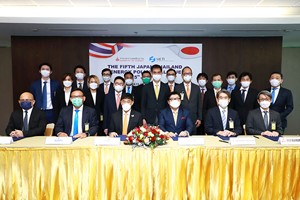News
MHI to collaborate in feasibility studies on ammonia co-firing for power generation
Mitsubishi Heavy Industries (MHI) signed a Memorandum of Understanding (MoU) to collaborate in a feasibility study for the introduction of ammonia co-firing at a coal-fired thermal power plant operated by BLCP Power Limited (BLCP), which is an independent power producer (IPP) in Thailand and a joint-venture between Banpu Power Public Company Limited (BPP) and Electricity Generating Public Company Limited (EGCO Group). The project aims to decarbonize the existing power plant, supporting Thailand in achieving its climate ambitions and becoming a low-carbon society.
The MoU was signed during the Japan-Thailand Energy Policy Dialogue (JTEPD) held in Thailand’s capital Bangkok on January 12. Several Thai and Japanese organizations in addition to MHI and BLCP are also involved in the project, exemplifying the importance of international cooperation in reducing global emissions. These include BPP and EGCO Group from Thailand, as well as JERA Co., Inc. and Mitsubishi Corporation from Japan.
Under the feasibility study plan, MHI, with support from its power solutions brand Mitsubishi Power, will determine and conduct a study on supply of ammonia burners, boiler facilities and equipment necessary for ammonia co-firing. JERA will examine the procurement and transportation of ammonia fuel, whereas JERA and Mitsubishi Corporation will investigate the port facilities, along with ammonia receiving and storage facilities. This will go toward establishing an integrated fuel value chain from procurement to utilization. BLCP, MHI, Mitsubishi Corporation and JERA will also jointly conduct studies and develop plans to achieve up to 20% ammonia co-firing, supporting reductions in CO2 emissions and decarbonization.
Located in Rayong province in southeastern Thailand, the BLCP Power Station comprises two subcritical coal-fired boilers with a total output of 1,434 megawatts that began operations in 2006 and 2007. MHI supplied the boilers, steam turbines and other main facilities of the power station.
Thailand has announced its commitment to reach carbon neutrality by 2050, and net-zero greenhouse gas emissions by 2065. The country plans to strengthen cooperation with Japan regarding decarbonization technologies for fuels such as ammonia and H2.


